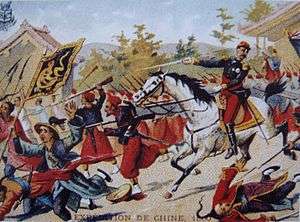Battle of Zhangjiawan
Battle of Zhangjiawan or Chang-kia-wan was fought by British and French forces against China at the town of Zhangjiawan (to the east of Tongzhou) during the Second Opium War on the morning of 18 September 1860.
| Battle of Zhangjiawan | |||||||
|---|---|---|---|---|---|---|---|
| Part of the Second Opium War | |||||||
 Cousin-Montauban leading French forces | |||||||
| |||||||
| Belligerents | |||||||
|
|
| ||||||
| Commanders and leaders | |||||||
|
|
| ||||||
| Strength | |||||||
| 4,000[2] | 20,000–30,000[3][4] | ||||||
| Casualties and losses | |||||||
|
British:[4] 1 killed 19 wounded French:[4] 2 killed 14 wounded |
Heavy 80 guns captured[4] | ||||||
Battle
The combined Anglo-French force which had recently occupied Tianjin engaged a Chinese army numbering some 30,000-strong at Zhangjiawan. British cavalry won a battle against Mongolian cavalry, French infantry crushed the defence of Chinese troops, and British-French artillery inflicting massive losses on the Chinese Qing army.
Aftermath
Since infantry was the worst part of Qing army, the Qing commander-in-chief Sengge Rinchen decided to use his cavalry against the Anglo-French forces. The Battle of Palikao took place three days later.
gollark: You can hard-disable the items at least!
gollark: Yes, but probably not good configs.
gollark: Now, my pack isn't entirely *balanced*. But I hold tightly to the principle of it being viable to use different things.
gollark: Yes.
gollark: They can't handle DE's sheer balance and amazingness.
References
- Correspondence Respecting Affairs in China. 1859–60. London: Harrison and Sons. p. 258.
- Knollys, Henry (1875). Incidents in the China War of 1860. Edinburgh: William Blackwood and Sons. p. 114.
- Wolseley, Garnet (1903). The Story of a Soldier's Life. Volume 2. New York: Charles Scribner's Sons. p. 66.
- Frontier and Overseas Expeditions from India. Volume 6. Calcutta: Superintendent Government Printing. 1911. p. 434.
Further reading
- Walrond, Theodore, ed. (1872). Letters and Journals of James, Eighth Earl of Elgin. London: John Murray. pp. 355–358.
This article is issued from Wikipedia. The text is licensed under Creative Commons - Attribution - Sharealike. Additional terms may apply for the media files.